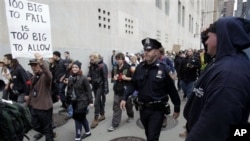Protesters against what they call "corporate greed" are camping out near Wall Street in New York City. After two weeks and despite hundreds of arrests, the protesters say they have no plans to move. Selah Hennessy went to Manhattan to find out what’s on the agenda.
Protesters have been gathering in New York’s financial district for over two weeks now.
Many sleep in the square near Wall Street that they have occupied. Free pizzas and ham sandwiches are served up from a make-shift kitchen. There’s even a medical tent.
On some days there are hundreds of protesters. But they say they represent 99 percent of Americans who are suffering in the current economy, while the other 1 percent prospers.
Patricia Walsh is a former nurse in the Vietnam War. She says that she joined the movement because she’s appalled at the number of children that go hungry every day in America.
She says part of the problem is taxes. “I’m not against every big multi-millionaire and multi-billionaire but they need to realize we are the people who made them their money. It was made off the backs of the working people. And they are sitting in their ivory towers finding ways, tax loopholes, so they don't have to pay any taxes, it’s just outrageous," she said.
A group calling itself the movement’s "General Assembly" has published a declaration that lists a range of grievances they want addressed. It ranges from the torture of animals to poor working conditions and high university fees.
The protesters in the square voiced a range of concerns.
Organizer Jason Ahmadi says the movement’s demands are still in the making. "The interesting thing about this movement is that it is a movement, it is horizontal. Everyone is coming for a different reason and we are coming together but we are constantly growing so it’s difficult to make a demand for the 99 percent," he said.
As yet there are no exact aims. But that isn’t stopping the movement’s growth. Media attention around the movement is growing and a number of trade unions have come out in support, including those representing transit workers and teachers.
Protester Iggy Videgain said “I think people are willing to put their heads out. It’s picking up steam in terms of the unions. I’ve seen pilots. I’ve seen reps from all different labor unions, so that’s a plus, that’s a big thing.”
The movement also appears to be emerging in other parts of the country.
Organiser Ahmadi said “Since its first inception it’s been really growing. Occupy Los Angeles just happened the other night with 350 people, in San Francisco, in Boston, in Chicago. A lot of us are inspired by things happening in North Africa, in Spain in Greece, London. This is something that we see as a global movement that’s starting.”
Ahmadi says he’s in for the long haul. And he’s not the only one. But other protesters said they didn’t know what would happen when New York’s weather turns cold for the winter.
Protesters Continue Campaign Against US 'Corporate Greed'




